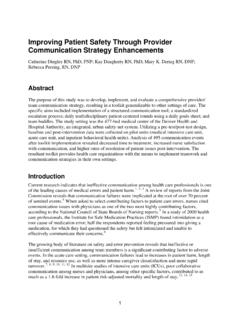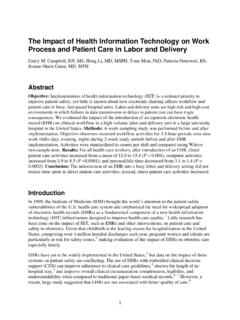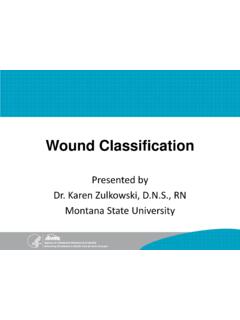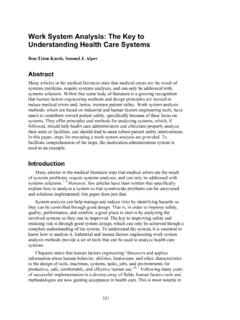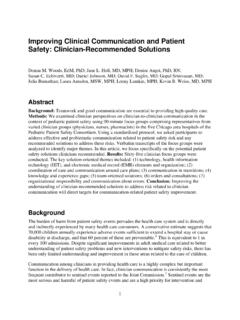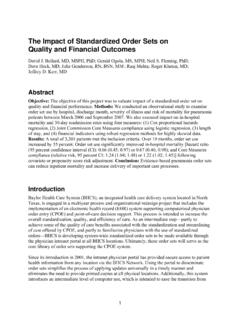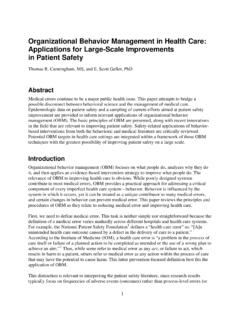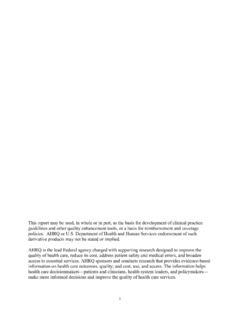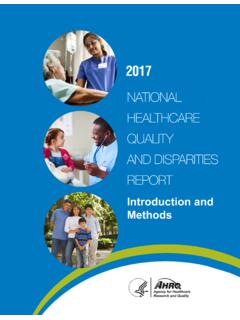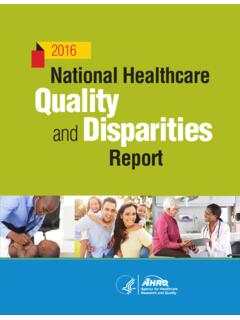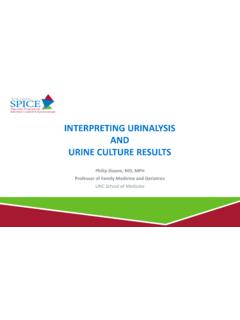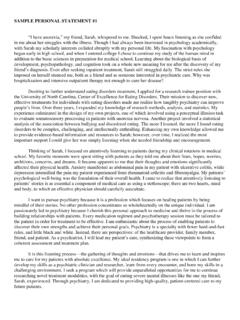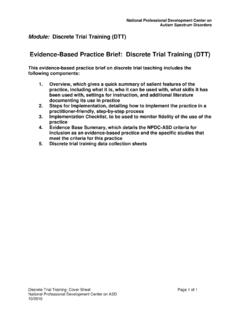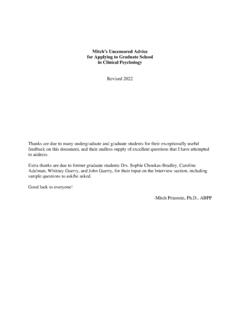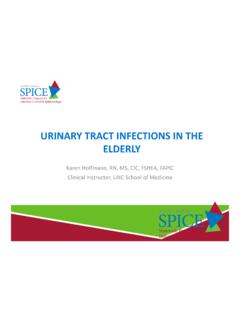Transcription of Health Literacy Universal Precautions Toolkit
1 Health Literacy Universal Precautions Toolkit Health Literacy Universal Precautions Toolkit Prepared for: Agency for Healthcare Research and Quality Department of Health and Human Services 540 Gaither Road Rockville, MD 20850 Contract No: HHSA290200710014 Prepared by: north carolina Network Consortium The Cecil G. Sheps Center for Health Services Research The university of north carolina at Chapel Hill Chapel Hill, NC Authors: The Cecil G. Sheps Center for Health Services Research Darren A. DeWalt, , Leigh F. Callahan, Victoria H. Hawk, , Kimberly A. Broucksou, , Ashley Hink, Harvard school of Public Health Rima Rudd, Agency for Healthcare Research and Quality Cindy Brach, AHRQ Publication No. 10-0046-EF April 2010 Health Literacy Universal Precautions Toolkit AHRQ Pub. No. 10-0046-EF This document is in the public domain and may be used and reprinted without permission except those copyrighted materials noted for which further reproduction is prohibited without the specific permission of copyright holders.
2 The findings and conclusions in this Toolkit are those of the authors, who are responsible for its contents; the findings and conclusions do not necessarily represent the views of the Agency for Healthcare Research and Quality (AHRQ) or the Department of Health and Human Services (HHS). Therefore, no statement in this Toolkit should be construed as an official position of AHRQ or HHS. Suggested Citation: DeWalt DA, Callahan LF, Hawk VH, Broucksou KA, Hink A, Rudd R, Brach C. Health Literacy Universal Precautions Toolkit . (Prepared by north carolina Network Consor-tium, The Cecil G. Sheps Center for Health Services Research, The university of north carolina at Chapel Hill, under Contract No. HHSA290200710014.) AHRQ Publication No. 10-0046-EF) Rockville, MD. Agency for Healthcare Research and Quality. April 2010. Health Literacy Universal Precautions Toolkit AHRQ Pub. No. 10-0046-EF Acknowledgements We thank the representatives of the north carolina Network Consortium, The Cecil G.
3 Sheps Center for Health Services Research, and the Harvard school of Public Health . Our thanks go to our Expert Advisory Panel members: Ed Wagner, , The MacColl Institute for Healthcare Innovation Group Health Center for Health Studies Seattle, WA Michael Barr, , , American College of Physicians Washington, DC Michael Paasche-Orlow, , Boston university school of medicine Boston, MA Toni Cordell Patient Advocate Charlotte, NC Gail Neilsen, , , Iowa Health Systems Des Moines, IA Special thanks to Sue Stableford, , , Director of the Health Literacy Institute in Portland, Maine. We acknowledge the following practices for helping to test the Toolkit . Matthews Health Clinic Matthews, NCBiddle Point Family Medical Center Charlotte, NC Dayspring Family medicine Eden, NCSiler City Community Health Center Siler City, NC HealthServe Community Health Clinic Greensboro, NC Cornerstone Medical Center Burlington, NC Myers Park Pediatrics Charlotte, NC UNC Family medicine Chapel Hill, NC Health Literacy Universal Precautions Toolkit AHRQ Pub.
4 No. 10-0046-EF Table of Contents About this Toolkit i Quick Start Guide ii Overview of Health Literacy Universal Precautions 1 Path To Improvement 10 References 12 List of Tools 14 Tools to Start on the Path to Improvement Tool 1: Form a Team 15 Tool 2: Assess Your Practice 18 Tool 3: Raise Awareness 22 Tools to Improve Spoken Communication Tool 4: Tips for Communicating Clearly 25 Tool 5: The Teach-Back Method 28 Tool 6: Followup with Patients 31 Tool 7: Telephone Considerations 34 Tool 8: Brown Bag Medication Review 37 Tool 9: How to Address Language Differences 41 Tool 10: Culture and Other Considerations 46 Tools to Improve Written Communication Tool 11: Design Easy-to-Read Material 49 Tool 12: Use Health Education Material Effectively 53 Tool 13: Welcome Patients: Helpful Attitude, Signs, and More 57 Tools to Improve Self-Management and Empowerment Tool 14: Encourage Questions 60 Tool 15: Make Action Plans 63 Tool 16: Improve Medication Adherence and Accuracy 66 Tool 17: Get Patient Feedback 69 Tools to Improve Supportive Systems Tool 18: Link Patients to Non-Medical Support 73 Tool 19: Medication Resources 77 Tool 20: Use Health and Literacy Resources in the Community 79 Health Literacy Universal Precautions Toolkit AHRQ Pub.
5 No. 10-0046-EF Table of Contents Appendix Items 83 Plan-Do-Study-Act (PDSA) Directions and Examples 84 Plan-Do-Study-Act (PDSA) Worksheet 93 PowerPoint Presentation Health Literacy : Barriers and Strategies 95 Health Literacy Assessment Questions 123 Questions for Discussion 130 Moderator s Guide 132 Communication Self-Assessment 134 Key Communication Strategies Poster 136 PowerPoint Presentation-Teach-Back: A Health Literacy Tool to Ensure Patient Understanding 138 Teach-Back Self-Assessment Evaluation and Tracking Log 159 Followup Instruction Form 161 Sample Automated Telephone System Menu 163 Brown Bag Medication Review Poster 165 Adult Initial Health History Form 167 Young Child Health History Form 177 Adult Return Visit Update Form 187 Consent to Treat Form 189 Release of Medical Information 191 Lab Results Letter 194 Appointment Reminder 196 The Action Plan Form and Example 198 Medication Aid Poster 201 Sample Cover Letter 203 Community Referral Form and Example 205 List of Internet Resources 208 Health Literacy Universal Precautions Toolkit AHRQ Pub.
6 No. 10-0046-EF About this Toolkit The Agency for Healthcare Research and Quality (AHRQ) commissioned The Uni-versity of north carolina at Chapel Hill to develop and test this Health Literacy Uni-versal Precautions Toolkit . It provides step-by-step guidance and tools for assessing your practice and making changes so you connect with patients of all Literacy levels. Toolkit Key Throughout the Toolkit we have used a number of icons and symbols to help you quickly identify different forms of tools and documents. Tools for practice change Video Document in the appendix Resources on the Internet Testimonials from a practice Tips or key points All blue underlined words are links to other Toolkit documents or Internet resources ( Web sites, videos, publications, articles.) Click on the words to connect to the link.
7 We also have a list of Internet resources along with their URLs. Toolkit Design This Toolkit is designed to be used by all levels of staff in a practice providing pri-mary care for adults and/or pediatric patients. (Please note that references to patients also includes caregivers and parents.) This Toolkit is divided into manageable chunks so that its implementation can fit into the busy day of a practice. It contains: Quick Start Guide If you want to jump right in and try something, this is a one page guide that will get you started. Overview This section provides some important background about Health Literacy Universal Precautions and how this Toolkit is designed to address them (9 pages). Path to Improvement This two-page document outlines the six steps to take to fully implement this Toolkit into your practice. Tools The Toolkit contains 20 tools (2-5 pages long) to help you iden-tify and address areas that need improvement.
8 These tools often refer-ence resources on the Internet as well as appendix items. Appendix The appendix contains over 25 resources such as forms, PowerPoint presentations, worksheets, and posters that support the im-plementation of the tools. It also contains a list of Internet-based re-sources that are referenced throughout the Toolkit . Health Literacy Universal Precautions Toolkit AHRQ Pub. No. 10-0046-EF iQuick Start Guide Watch a short video. This 6-minute Health Literacy video is sponsored by the American College of Physicians (ACP) Foundation and has some vivid examples of why addressing Health Literacy is so important. Pick a tool and try it. Link to one of these tools and review it. Pick a day and try it out on a few patients. I want to be confident my patients are taking their medications correctly. Brown Bag Medication Review I want to be confident that I am speaking clearly to my patients.
9 Tips for Communicating Clearly I want to be confident that my patients understand what they need to do regarding their Health when they get home. The Teach-Back MethodAssess your results. How did it go? Do you need to make some adjustments? Do you want to address another statement from the list above and try another tool? Or, you may want to take this to the next step by going to the Overview and learning about Health Literacy Universal Precautions and this Toolkit . Health Literacy Universal Precautions Toolkit AHRQ Pub. No. 10-0046-EF ii Health Literacy Universal Precautions Toolkit AHRQ Pub. No. 10-0046-EF 1 Overview of Health Literacy Universal Precautions Medical care is complicated, and many people struggle with understanding medications, self care, instructions, and followup plans. The way we organize our practice and communicate with patients can help to minimize confusion and lead to better Health outcomes.
10 This Toolkit is designed to help practices take a systematic approach to reducing the complexity of medical care and ensure that patients can succeed in the Health care environment. Testimonials Before reviewing this Toolkit , we had never heard the term Health liter-acy. As we assessed our practice and reviewed the tools, we realized that the concerns addressed in this Toolkit are things we see and struggle with every day. This Toolkit made us more aware of the challenges that our patients face and guided us to make meaningful changes throughout our practice. -office manager, rural family practice clinic When we introduced this Toolkit to our staff, they thought oh great, more responsibilities for us to cram in to our busy day. But what we quickly realized is that it is not adding more, it is about learning how to do things differently. After implementing some of these tools, we really felt like we were more able to connect with our parents about the Health of their child.
